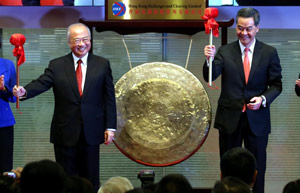More go abroad for healthcare
Updated: 2014-11-22 09:45
By Liu Zhihua(China Daily)
|
||||||||
Not just for celebrities
The phenomenon of Chinese traveling abroad for medical care emerged first among celebrities and entertainment-industry people. They often sought anti-aging therapies and plastic surgeries, according to Hu Ping, an executive with the Shanghai agency.
However, the trend gradually is gaining momentum among other rich people, such as senior executives, and the overseas medical services Chinese seek are now shifting from cosmetic procedures to medical checkups, cancer treatments, reproductive procedures and rehabilitation, Hu notes.
The reasons, Hu explains, are mixed.
For one thing, the high-pressure, fast-paced and sedentary lifestyle in China's fast-developing society is taking its toll on people's health. As a result, compared to the 1990s, there are obvious increases in the rates of many chronic diseases, such as cancer and vascular disease.
For another, the advanced medical technology and more humanistic medical practices in developed countries, including a hospital environment that protects privacy, are very appealing to wealthy Chinese, especially when more people can afford overseas medical treatment.
Hu also points out that more hospitals and medical organizations abroad now eye the Chinese market.
Since about three years ago, her agency has been receiving dozens of cooperation requests from abroad every year, and the number keeps growing.
"It is not new that Chinese go abroad for medical services, but it is new that foreign medical institutes now reach out to the Chinese market," Hu says.
Office attracts patients
Oregon Reproductive Medicine, a Portland-based fertility clinic in the US, has benefited from establishing its Shanghai offices.
Ai Si (not her real name), a 38-year-old Shanghai resident, recently decided to go to ORM to have a second baby through in-vitro fertilization.
She had heard about the higher success rate of in-vitro fertilization in the US than that in China, and also feared that Chinese hospitals would sometimes act for profit and convenience rather than out of patients' best interests, even though her fears may be unfounded.
But the main reason she chose ORM was because it has offices in Shanghai, which she believes is a demonstration of its capability, especially after she had visited one of its offices.
The cost of the treatment varies from $15,000 to $80,000, depending on personalized treatment protocols, but Ai says money is not an issue.
In the past year, there have been about 50 patients in the clinic from China, says Zhang Jianmei, the patient coordinator with the clinic.
Zhang believes Chinese patients choose ORM primarily because they want to have medical services that are based on advanced medical technology and have higher success rates.

 Chocolate warriors with Christmassy characteristics
Chocolate warriors with Christmassy characteristics
 Trending: Panda beating video triggers outrage
Trending: Panda beating video triggers outrage
 Culture Insider: 7 things you may not know about Minor Snow
Culture Insider: 7 things you may not know about Minor Snow
 Practitioners adapt old operas to fit modern lifestyles, tastes
Practitioners adapt old operas to fit modern lifestyles, tastes
 The future of the Asian Pacific
The future of the Asian Pacific
 Early start to family life
Early start to family life
 Lantern festival coming to California
Lantern festival coming to California
 Across America over the week (Nov 14- Nov 20)
Across America over the week (Nov 14- Nov 20)
Most Viewed
Editor's Picks

|

|

|

|

|

|
Today's Top News
Chinese newspaper, magazines punished
Strong earthquake hits SW China
China's interest rates cut to bolster growth
Kekexili applies for world heritage
Banner year for US, NYC real estate investment
Obama takes executive action on immigration
China's central bank cuts interest rates
Lantern festival coming to California
US Weekly

|

|







